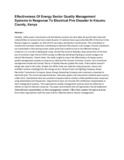Effectiveness Of Energy Sector Quality Management Systems In Response To Electrical Fire Disaster In Kisumu County, Kenya
Abstract
Globally, utility power transmission and distribution systems are described along with their observed vulnerabilities to natural and man-made hazards. At national level, approximately 40% of the load in the Western region is supplied via 33/0.433 kV secondary distribution transformers. This contributes to transformer overload strain thus contributing to electrical fire disasters and outages. Kisumu substations are overloaded in the existing system under peak load conditions due to low thermal rating of conductors as a result of inadequate sizing. Several line sections feeding a large proportion of the load are of conductor type 25mm2 ASCR causing an effective bottleneck leading to power outages and electric fire disasters. Due to these, the study sought to assess the effectiveness of energy sectors quality management systems in response to electrical fire disaster in Kisumu County. Cross-functional management model and Crosby Theory of Quality theories guided the study. A descriptive research design was used in the study. Sample size of the study was selected using purposive, census and stratified random sampling from the energy sectors; Kenya Power and Lighting Company, Kenya Electricity Transmission Company, Kenya Energy Generating Company and customers connected to electricity grid. The structured questionnaires, interviews guides and observation methods were used to collect data. Quantitative data was analyzed using descriptive statistics while qualitative data responses using thermalized and frequencies. Organizations have not ensured ISO certification requirements in their management systems. That organizations quality management systems were less effective in relation to electric disasters response. The paper recommends that all organization should implement ISOcertification requirements on their management systems. Effect their systems through assistance from other organizations with the same role for effective electric disaster management.
URI
https://doi.org/10.29322/IJSRP.10.11.2020.p10752http://www.ijsrp.org/research-paper-1120.php?rp=P10710715
http://ir-library.mmust.ac.ke:8080/xmlui/handle/123456789/1840
Collections
- Journal Articles [411]

